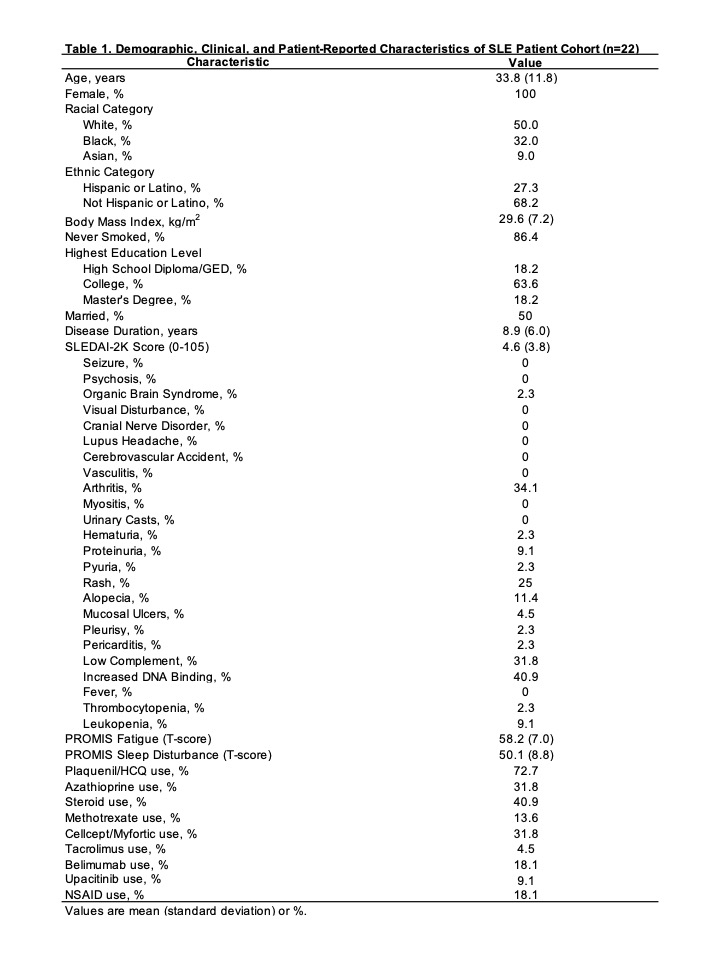Session Information
Date: Tuesday, October 28, 2025
Title: (2377–2436) Systemic Lupus Erythematosus – Diagnosis, Manifestations, & Outcomes Poster III
Session Type: Poster Session C
Session Time: 10:30AM-12:30PM
Background/Purpose: Mechanisms driving cognitive impairment (CI) in systemic lupus erythematosus (SLE) remain poorly understood; conflicting results exist regarding the relationship between CI and disease activity. NIH Toolbox for Assessment of Neurological and Behavioral Function (NIHT) is widely utilized to monitor CI in conditions like Alzheimer’s disease and long COVID, yet few reports address its value in measuring CI in SLE. Further, the relationship between NIHT’s subdomains and SLE disease activity has yet to be explored. We hypothesize that NIHT can effectively characterize CI in persons with and without active SLE and help clarify if disease activity contributes to poor cognitive performance. A secondary aim is to identify serum and cerebrospinal fluid (CSF) biomarkers mediating immune-related neuropathology.
Methods: Cross-sectional data were analyzed from adult patients enrolled in our ongoing study of immune-mediated mechanisms of neuropsychiatric SLE. Eligible participants met 4 of 11 ACR 1997 or 3 of 11 ACR 1997 with SLICC 2012 criteria for SLE and did not have concurrent autoimmune or neurologic diseases, active or chronic infections, GFR< 60, liver enzymes >3× ULN, or sodium imbalance. Cognitive performance was assessed by the clinically validated Montreal Cognitive Assessment (MoCA), reported as total score, and a targeted NIHT battery, reported as age-adjusted standard scores. SLEDAI-2K≥6 defined moderate-high disease activity; SLEDAI-2K< 6 indicated low-moderately active or inactive disease. Note, only one participant scored for a neurological SLEDAI-2K descriptor. Descriptive statistics summarized demographic and clinical characteristics. Spearman correlations assessed relationships between continuous variables. Associations between continuous and categorical variables were assessed via Wilcoxon rank sum tests.
Results: Our sample included 22 female patients with SLE free of concurrent autoimmune or neurologic disease with mean (SD) age of 33.8 (11.8) years and disease duration of 8.9 (6.0) years (Table 1). Patients with moderate-high disease activity scored lower on the Dimensional Change Card Sort and Rey Auditory Verbal Learning Tests for executive function and delayed auditory-verbal memory, respectively, compared to those with inactive or low-moderate disease activity (Table 2,4). SLEDAI subcomponent scores did not associate with altered CI subdomains (Table 3). Yet, low circulating complement C4 correlated with worse delayed auditory-verbal memory. Findings were independent of demographic, patient-reported, clinical, and other lab characteristics (Table 2,4). MoCA did not differentiate groups, highlighting NIHT’s superior sensitivity.
Conclusion: The NIHT is a domain-specific, sensitive tool for detecting CI in SLE, outperforming the MoCA. Higher SLEDAI, but not subcomponent, scores correlate with executive function and memory impairments, supporting a role for generalized inflammation, and potentially C4, in SLE-related CI. Here, we advance the field by exploring the link between SLE disease activity and CI of domains essential for daily functioning and expanding immune profiling of serum and CSF to clarify the neuroimmune basis of these deficits.
To cite this abstract in AMA style:
Beiser S, Qureshi A, Safdar K, Orban Z, Carns M, Manada De Lobos V, Stumpf C, Khan M, Therron T, Chung A, Puev K, Pillai N, Aren K, Seagrist J, Song J, Ross J, Perlman H, Lee Y, Winter D, Bonakdarpour B, Siddiqui M, Arneson L, Ramsey-Goldman R, muhammad L, Mahieu M, Blanco I, Larson E, Grebenciucova E, Cuda C. Disease Activity Independently Correlates with Cognitive Impairment in Systemic Lupus Erythematosus [abstract]. Arthritis Rheumatol. 2025; 77 (suppl 9). https://acrabstracts.org/abstract/disease-activity-independently-correlates-with-cognitive-impairment-in-systemic-lupus-erythematosus/. Accessed .« Back to ACR Convergence 2025
ACR Meeting Abstracts - https://acrabstracts.org/abstract/disease-activity-independently-correlates-with-cognitive-impairment-in-systemic-lupus-erythematosus/


.jpg)